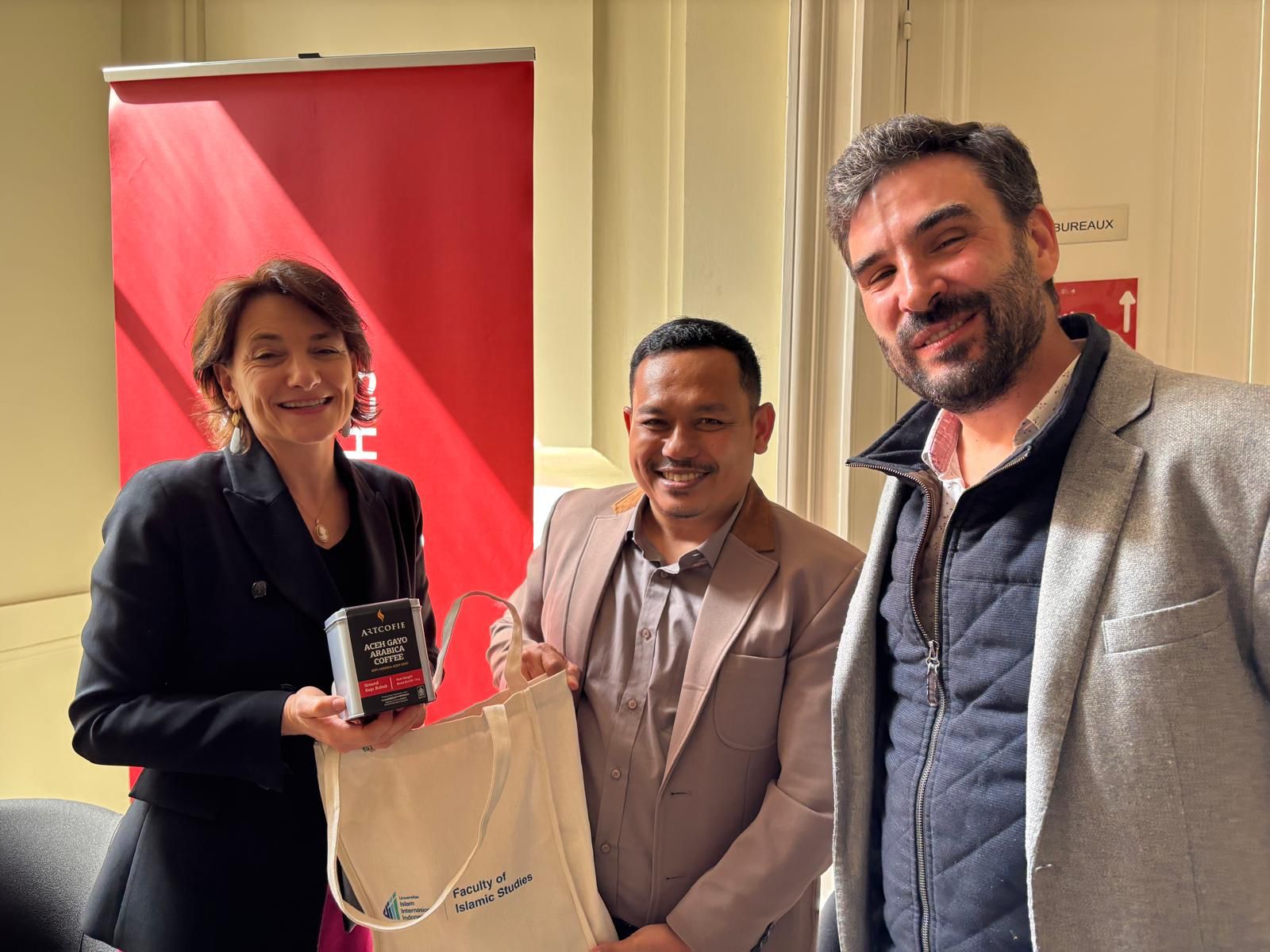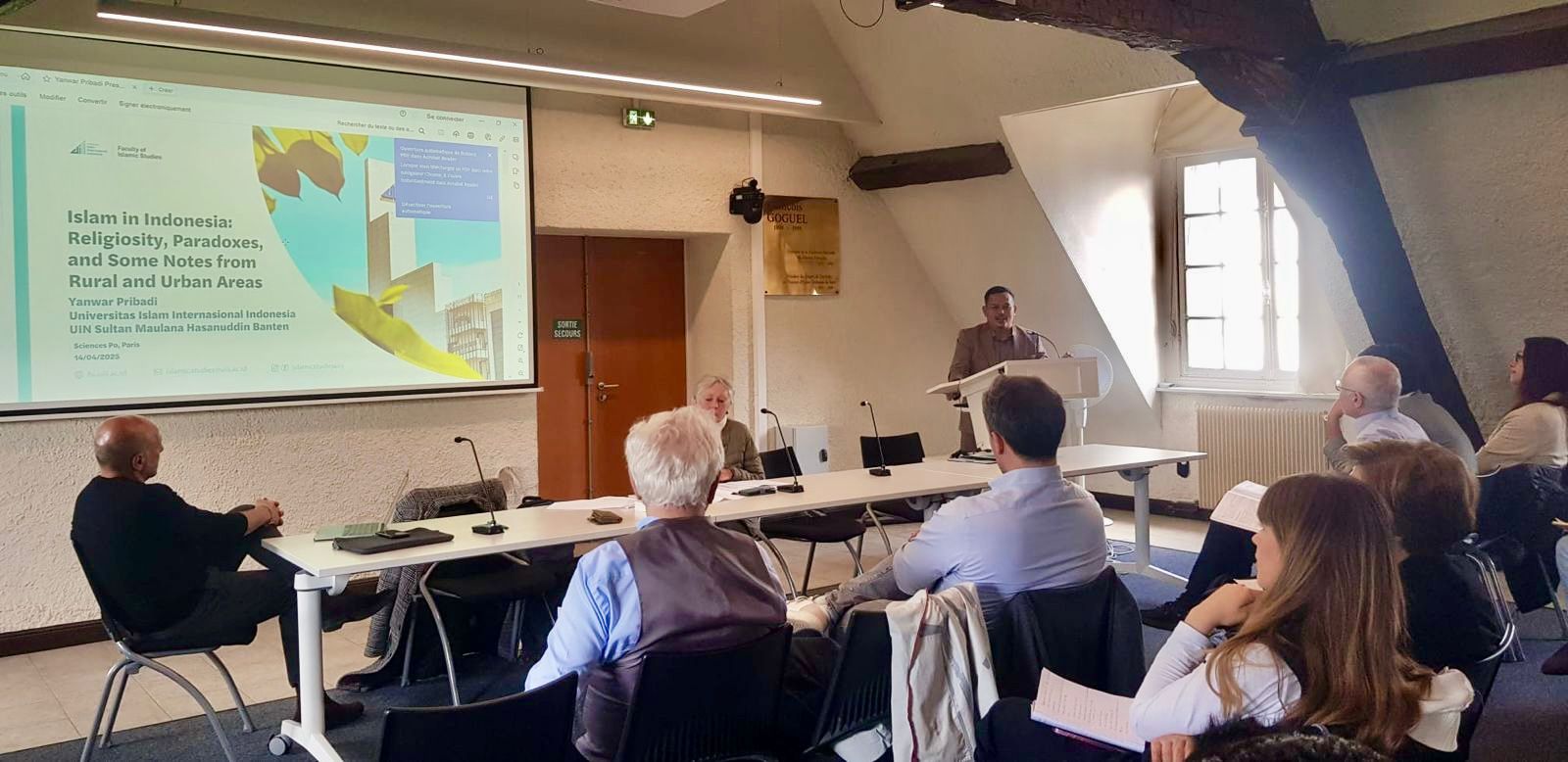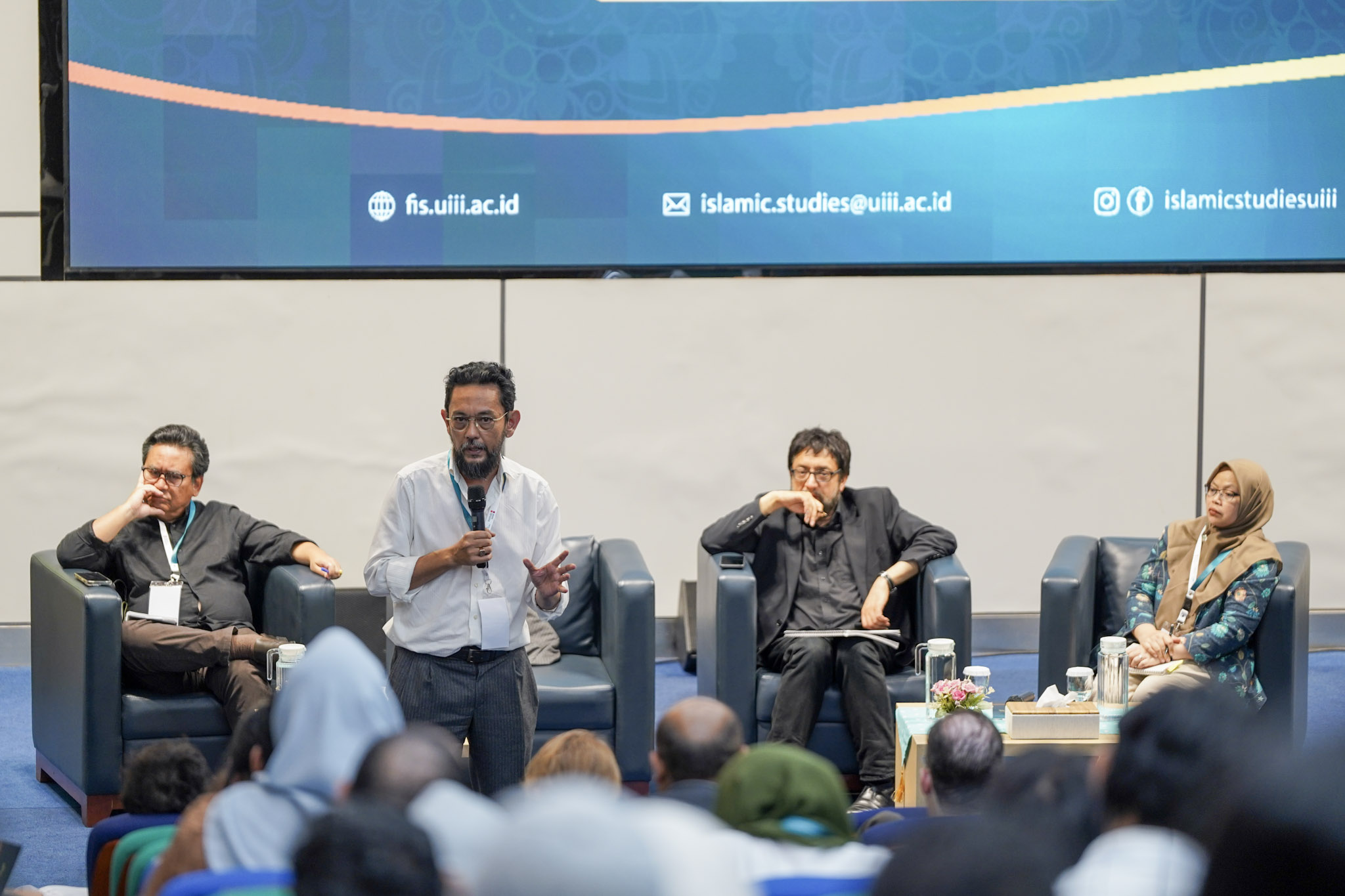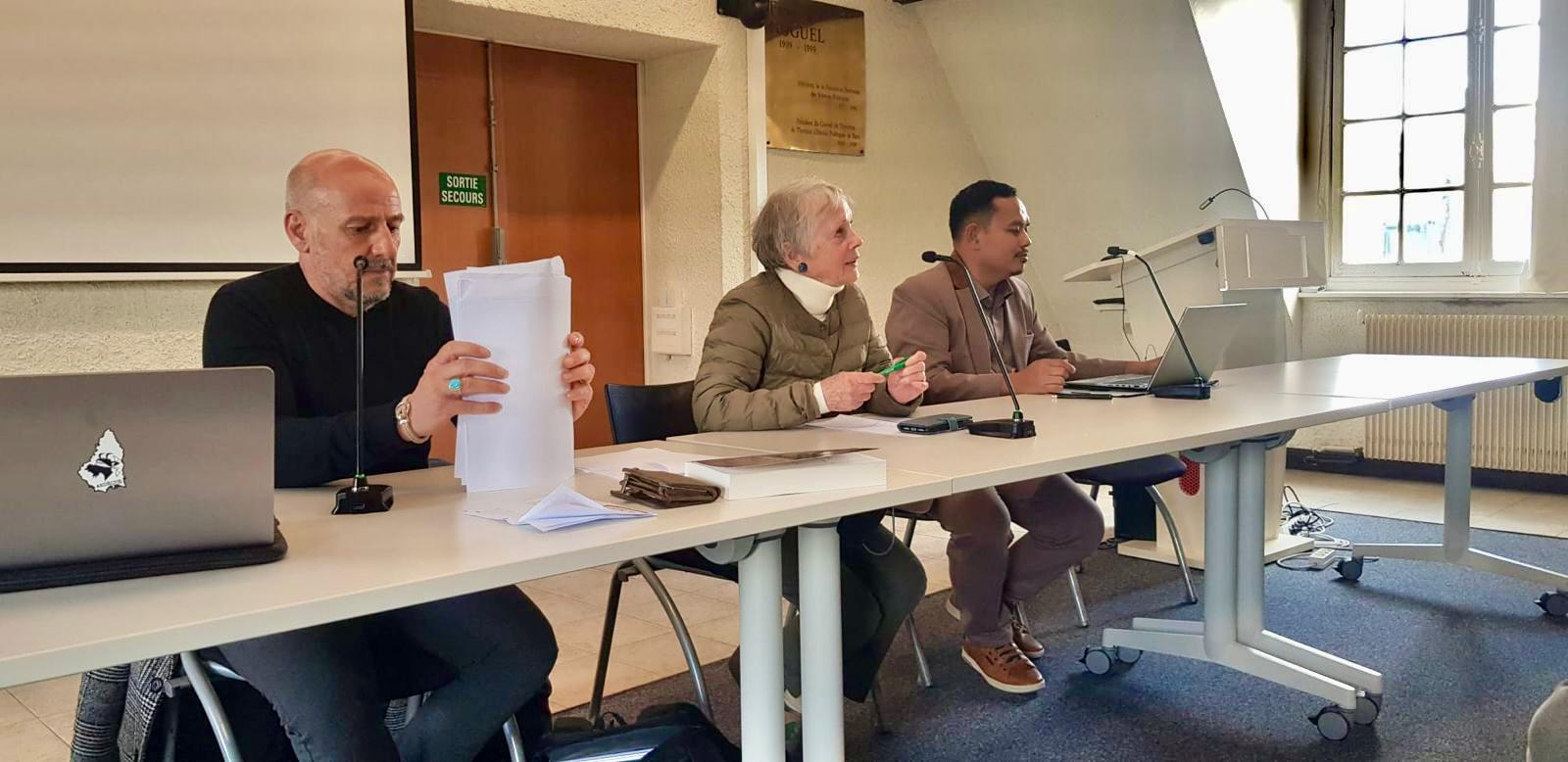May 19, 2025
By Dadi Darmadi

In Depok, Indonesia, the Faculty of Islamic Studies (FIS) at Universitas Islam Internasional Indonesia (UIII) is advancing the field of Islamic studies through rigorous scholarship and global engagement. Under the leadership of Professor Yanwar Pribadi, PhD, the faculty is producing innovative research that highlights Indonesia’s role in shaping contemporary Islamic thought.
Through recent international conferences and academic collaborations, including events in France and a major gathering at UIII, FIS is establishing itself as a vital contributor to global discussions on Islam, supported by the dedication of its lecturers, students, and university leadership.
Representing Indonesia in France
In April 2025, Pribadi traveled to France for two significant academic events. First, he was invited by Professor Stéphanie Balme, Director of Sciences Po’s Centre de Recherches Internationales (CERI), and Associate Professor Stéphane Lacroix, Co-Director of CERI’s Chair for the Study of Religion, to speak at a conference in Paris on April 14. Titled “Indonesia, the New Center of Islam? Local Dynamics and Global Engagements,” the event aimed to highlight Indonesia’s role in Islamic studies, a field often focused on the Middle East.
Pribadi presented on the complexities of religiosity in Indonesia, comparing urban and rural contexts to show the diversity of Islamic practice. His talk underscored Indonesia’s importance as the world’s largest Muslim-majority country and sparked interest in creating a center for Indonesian Islamic studies at Sciences Po.
As the representative of UIII, Indonesia’s only international Islamic university, Pribadi also discussed potential partnerships with Balme and Lacroix. These conversations explored how UIII could collaborate with Sciences Po to advance research on Islam in Indonesia, strengthening ties between the two institutions.
The next day, Pribadi spoke at Aix-Marseille University as part of the PredicMO research project’s seminar, “Dynamics of Islamic Preaching: Comparative Perspectives from Indonesia.” Alongside Lacroix, he examined Islamic preaching (pengajian) in urban and rural Indonesia. Lacroix offered a broader comparison with Middle Eastern Islam, while Pribadi provided a detailed analysis of how these study circles shape community life. Through both events, Pribadi showcased UIII’s academic expertise and its commitment to sharing Indonesia’s perspectives globally.

A Bold Conference at UIII
Back in Depok, Pribadi’s leadership drives the Faculty of Islamic Studies’ ambitious initiatives. On April 29–30, 2025, FIS hosted an international conference titled “Decolonizing Social Sciences and Humanities: Islamic and Non-Western Perspectives.” Organized in collaboration with Institute Social, Türkiye, the event challenged the dominance of Western frameworks in academic research. Its goal was to integrate Islamic and non-Western intellectual traditions, encouraging new approaches that better reflect global realities.
The conference drew remarkable interest, with 407 abstract submissions from 23 countries, including Australia, the United States, France, Malaysia, and the United Arab Emirates. From these, 50 presenters were selected to join nine distinguished speakers, including Anna Gade (University of Wisconsin-Madison), Syed Farid Alatas (National University of Singapore), and Recep Şentürk (Hamad bin Khalifa University), and Salman Sayyid (University of Leeds). Their discussions fostered collaboration across disciplines, laying the groundwork for innovative research methods.
This conference built on FIS’s tradition of addressing unconventional themes, a legacy shaped by Pribadi’s predecessor, Professor Noorhaidi Hasan, PhD, now rector of UIN Sunan Kalijaga Yogyakarta. Since 2022, the faculty has hosted annual conferences that rethink Islamic studies. The first, “Decentering Islamic Studies,” explored new ways to study Islam and Muslim societies. In 2023, “Fiqh and Justice in an ‘Abnormal’ Context” examined Islamic law in modern challenges. The 2024 conference, co-hosted with Leiden University, focused on “The Future of Artificial Intelligence in/and of Islam,” analyzing technology’s role in Muslim Southeast Asia. Each event has pushed the boundaries of how Islam is understood, both within and beyond Indonesia.

A New Approach
Under Pribadi’s guidance, FIS is developing a distinctive approach to Islamic studies—one that combines contemporary research with classical Islamic scholarship. This approach seeks to both revisit traditional ideas and address modern issues, positioning UIII as a leader in global Islamic studies. By hosting conferences that bridge Islamic and non-Western perspectives, FIS is creating space for fresh ideas and encouraging scholars to rethink established assumptions.
Pribadi is quick to acknowledge the support behind these achievements. He credits the dedication of FIS lecturers and students, whose intellectual energy fuels the faculty’s initiatives. He also expresses deep gratitude to UIII’s rector, University Secretary, and campus leaders, whose guidance has been instrumental in advancing the university’s mission. The foundation laid by Professor Noorhaidi Hasan has also been vital, providing a strong starting point for Pribadi’s efforts to elevate FIS’s global presence.
The faculty’s efforts are part of a larger goal: to establish Indonesia as a hub for Islamic studies. Pribadi and his colleagues are working to highlight Indonesia’s unique contributions, moving beyond frameworks centered on the Middle East or the West. Their conferences are not just academic gatherings but steps toward building a new model for studying Islam—one that is inclusive, forward-thinking, and grounded in diverse experiences.
A Lasting Impact
For Professor Yanwar Pribadi, this work is both a personal commitment and a global mission. As a scholar, he navigates the interplay of tradition and innovation. As a dean, he leads a faculty dedicated to bold ideas. And as a representative of UIII, he shares Indonesia’s intellectual contributions with the world, supported by a community that shares his vision.
In France, Pribadi opened doors for future collaborations. In Depok, he guides a faculty that is redefining Islamic studies. Together, these efforts are helping UIII emerge as a vital center for learning and dialogue. As Pribadi continues to foster connections and challenge conventional approaches, he is not only advancing the study of Islam but also affirming Indonesia’s growing role in shaping its future.

Universitas Islam Internasional Indonesia